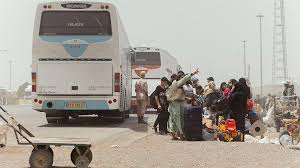Thousands of young Moroccans have taken to the streets across the country, demanding better hospitals, schools, and jobs instead of billion-dollar football stadiums.
The protests, led by a loose youth movement called Gen Z 212, began on 27 September 2025 in at least 10 cities. The group uses social media platforms like Discord, TikTok, and Instagram to organize demonstrations.
Their slogan is simple:
“No World Cup, health comes first.”
The government is currently spending an estimated $5 billion (£3.7bn) to prepare for co-hosting the 2030 FIFA World Cup, including building what will be the world’s largest football stadium with 115,000 seats.
But protesters argue that Morocco’s health and education systems are collapsing.
The spark for the movement was the death of eight women in a maternity ward in Agadir in mid-September. Reports suggest the women could have survived if hospitals had more staff, better care, and proper equipment.
According to the World Health Organization, Morocco has just 7.8 doctors per 10,000 people—far below the recommended 23 per 10,000.
Protesters say they are tired of seeing billions spent on football while basic services fail. Their demands include:
Free, quality education for all
Accessible healthcare for everyone
Decent housing and better public transport
Lower food prices and subsidies for basic goods
Fair wages and job opportunities for youth
English (not French) as Morocco’s second official language
So far, the response has been harsh. By October 1, the Interior Ministry confirmed:
409 people arrested
260 police officers injured
20 protesters injured
40 police vehicles and 20 private cars torched
Three protesters were killed in the town of Lqliaa when demonstrators tried to storm a police station. Authorities released CCTV footage claiming protesters attempted to steal weapons and set the building on fire.
Prime Minister Aziz Akhannouch said he is open to dialogue, but many protesters do not trust the government. Human rights groups and opposition parties have criticized the heavy-handed police response.
Hajar Belhassan, 25, a communications manager:
“We are making reasonable, basic demands. Health and education are necessities that should already be prioritised. It breaks my heart to see peaceful people arrested for asking for their rights.”
Hakim, 23 (not his real name), who was arrested:
“My father had a stroke. If we didn’t have savings for private care, he would have died. What am I gaining from a country that doesn’t provide healthcare or good education?”
This is not the first time young Moroccans have risen up. In: 1981, protests over food prices led to deadly riots known as the “Bread Martyrs.”
2011, during the Arab Spring, youth protests forced King Mohammed VI to reform the constitution.
2016, demonstrations erupted after a fish vendor was crushed to death in a garbage truck.
But Gen Z 212 is different. It has no political party ties and no central leader, making it harder for the government to control.
Despite anger, many protesters insist they are not against football or the World Cup itself.
“We love football, it is in our blood,” says Belhassan. “But first we need hospitals, schools, and jobs. Let’s take care of our people before building stadiums.”
With calls growing for King Mohammed VI to intervene, the protests show no sign of slowing. For Morocco’s youth, the fight is about dignity, equality, and building a future where they don’t feel forced to leave their own country.



